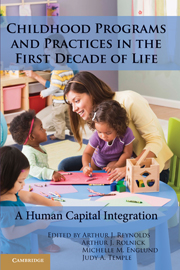Book contents
- Frontmatter
- Contents
- Contributors
- Foreword: The Essential Role of Youth Development by Robert H. Bruininks
- Acknowledgments
- 1 Early Childhood Development and Human Capital
- PART I PRENATAL AND INFANT PROGRAMS
- PART II PRESCHOOL EDUCATION
- PART III KINDERGARTEN AND EARLY SCHOOL-AGE SERVICES AND PRACTICES
- PART IV ECONOMIC SYNTHESES OF EARLY CHILDHOOD INVESTMENTS
- Commentary at the Human Capital Research Collaborative Conference
- 15 The Cost Effectiveness of Public Investment in High-Quality Prekindergarten: A State-Level Synthesis
- 16 The Fiscal Returns to Public Educational Investments in African American Males
- 17 A New Cost-Benefit and Rate of Return Analysis for the Perry Preschool Program: A Summary
- 18 Investing in Our Young People
- 19 Paths of Effects of Preschool Participation to Educational Attainment at Age 21: A Three-Study Analysis
- Appendix Question-and-Answer Sessions
- Name Index
- Subject Index
- References
19 - Paths of Effects of Preschool Participation to Educational Attainment at Age 21: A Three-Study Analysis
Published online by Cambridge University Press: 05 June 2012
- Frontmatter
- Contents
- Contributors
- Foreword: The Essential Role of Youth Development by Robert H. Bruininks
- Acknowledgments
- 1 Early Childhood Development and Human Capital
- PART I PRENATAL AND INFANT PROGRAMS
- PART II PRESCHOOL EDUCATION
- PART III KINDERGARTEN AND EARLY SCHOOL-AGE SERVICES AND PRACTICES
- PART IV ECONOMIC SYNTHESES OF EARLY CHILDHOOD INVESTMENTS
- Commentary at the Human Capital Research Collaborative Conference
- 15 The Cost Effectiveness of Public Investment in High-Quality Prekindergarten: A State-Level Synthesis
- 16 The Fiscal Returns to Public Educational Investments in African American Males
- 17 A New Cost-Benefit and Rate of Return Analysis for the Perry Preschool Program: A Summary
- 18 Investing in Our Young People
- 19 Paths of Effects of Preschool Participation to Educational Attainment at Age 21: A Three-Study Analysis
- Appendix Question-and-Answer Sessions
- Name Index
- Subject Index
- References
Summary
A hallmark of preschool programs is their capacity to promote lasting effects on child well-being into adulthood. Long-term beneficial effects of early childhood programs have been documented for school performance and achievement, antisocial and criminal behavior, educational attainment, economic well-being, parenting behaviors, health status and behavior, and mental health (Campbell & Ramey, 1995; Karoly, 2001; Karoly, Cannon, & Kilburn, 2005; McLaughlin, Campbell, Pungello, & Skinner, 2007; Reynolds et al., 2007; Schweinhart, Barnes, & Weikart, 1993; Temple & Reynolds, 2007).
The most consistently observed and consequential long-term effects of preschool programs are for educational attainment. Measured by high school completion, years of education, or college attendance, higher educational attainment has been demonstrated in model (Campbell, Ramey, Pungello, Sparling, & Miller-Johnson, 2002; Consortium for Longitudinal Studies, 1983; Schweinhart et al., 1993, 2005) and large-scale programs (Currie & Thomas, 2000; Garces, Thomas, & Currie, 2002; Oden, Schweinhart, Weikart, Marcus, & Xie, 2000; Reynolds, Temple, Robertson, & Mann, 2001). Educational attainment is a key determinant of economic well-being and is a fundamental measure for estimating economic returns in cost-benefit analysis. Although long-term positive effects of preschool have been found for other adult outcomes such as employment and income (Schweinhart et al., 1993), crime prevention (Reynolds et al., 2001; Schweinhart et al., 1993), health status and behavior, and mental health (McLaughlin et al., 2007; Reynolds et al., 2007), they have been demonstrated less consistently.
Information
- Type
- Chapter
- Information
- Childhood Programs and Practices in the First Decade of LifeA Human Capital Integration, pp. 415 - 452Publisher: Cambridge University PressPrint publication year: 2010
References
Accessibility standard: Unknown
Why this information is here
This section outlines the accessibility features of this content - including support for screen readers, full keyboard navigation and high-contrast display options. This may not be relevant for you.Accessibility Information
- 11
- Cited by
